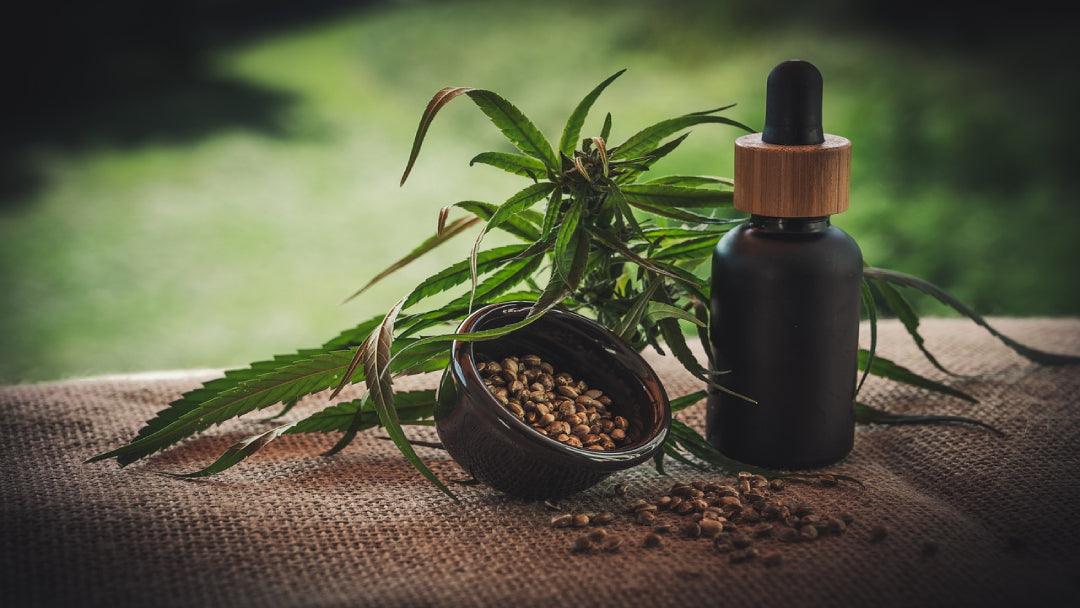Full-Spectrum vs. Broad-Spectrum vs. CBD Isolate. While shopping for CBD products, you’ve likely noticed different options—like full-spectrum, broad-spectrum, and CBD isolate.
You might be tempted to think that “CBD is CBD,” but these three types of products are all quite different.
We’ll help you understand the difference between the three and determine which one is best for you.
Want to skip the read and find the right CBD product for you? Whether it’s for pain relief, better sleep, or general use, we have the CBD you need!
Related: CBD Isolate & Full-Spectrum CBD Compared
What Is Full-Spectrum CBD?
If a CBD extract says full-spectrum on the label, it means that the product contains all of the phytochemicals found in the cannabis plant, including:
- CBD
- Terpenes
- Cannabinoids
- THC (below 0.3%)
This full spectrum of active compounds extracted from the plant work together to amplify the effects of each individual cannabinoid, including CBD—a phenomenon called the entourage effect that we’ll discuss later.
Although full-spectrum CBD is not psychoactive, it does contain trace amounts of THC, which can result in false positives during drug tests. If you want to avoid that, then that’s where broad-spectrum CBD comes into play.
What Is Broad-Spectrum CBD?
Next, we have broad-spectrum CBD, which contains all of the same compounds as full-spectrum products without the THC—manufacturers remove it entirely after the initial extraction.
So, while broad-spectrum CBD still produces the entourage effect, it does so without the THC, removing the possibility of false positives from the table.
You can also think of broad-spectrum CBD as a mix between full-spectrum and CBD isolate—it contains the full spectrum of cannabinoids save for the THC.
What Is CBD Isolate?
CBD isolate is most easily described as pure CBD—it’s made by extracting compounds from the plant similarly to full-spectrum and broad-spectrum; however, every compound other than CBD gets removed.
The benefit of CBD isolate is that it allows you to get the highest concentration per serving—because isolates are pure cannabidiol, a single gram can carry close to 1,000 mg of CBD.
However, CBD isolate does not provide the entourage effect; instead, it only offers the potential benefits of CBD, which are still significant. Full-Spectrum vs. Broad-Spectrum vs. CBD Isolate.
So, how important is the entourage effect to you? Let’s see if it’s worth the hype.
Full-Spectrum CBD, Broad-Spectrum CBD, and the Entourage Effect
The name might sound complicated; however, the premise of the entourage effect is quite simple: it’s the result of the synergy of every compound found in the cannabis plant.
These compounds all work together, enhancing the potential benefits of the others, and amplifying their therapeutic properties while mitigating any potential side effects.
Some of the cannabinoids found in full-spectrum and broad-spectrum extracts include:
- CBN
- CBC
- CBG
- CBDA
- CBDV
As you might’ve guessed, because of the benefits the entourage effect can bring, broad-spectrum and full-spectrum CBD products typically cost more than CBD isolate, with full-spectrum being the most expensive.
Related: Can People Take Pet CBD Oil?
Which Type of CBD Is Right for You? Pros and Cons

Now that we’ve gone through the entire CBD spectrum, you might still be wondering which CBD product is right for you—why would you choose one over the other?
First, it’s important to understand that there’s not one that’s inherently better than the other; everyone has different needs and reacts to CBD differently. A CBD product that works great for your friend might not be the best choice to you—it largely comes down to personal preference.
However, to help you decide, we’ve mapped out the pros and cons of full-spectrum, broad-spectrum, and CBD isolate to help you choose which one to try first.
Full-Spectrum CBD
Pros:
- You get the benefits of the entourage effect.
- It’s the least-processed type of CBD.
- It contains flavonoids and terpenes, which may have additional health benefits.
Cons:
- It can show up on drug screenings.
- The THC content can cause issues depending on the laws in your state.
- It has a strong natural aroma and flavor from the hemp plant, which can be overwhelming.
Potential Uses:
- Full-spectrum products can be great for individuals who want to benefit from the trace amounts of THC that these extracts contain.
- Some people who don’t find relief with other types of CBD may benefit more from full-spectrum products.
- It’s typically the choice for CBD users who live in states with legal cannabis.
Broad-Spectrum CBD
Pros:
- Like full-spectrum CBD, broad-spectrum CBD products offer the benefits of the entourage effect.
- It’s less processed than CBD isolate (but more than full-spectrum CBD).
- There’s less risk of psychoactive effects or false positives on drug screenings.
Cons:
- There’s less research on broad-spectrum CBD compared to full-spectrum CBD.
- It’s not as widely available as CBD isolate and full-spectrum CBD.
- It can also carry a strong hemp flavor that some people do not enjoy.
Potential Uses:
- CBD users that don’t get relief from isolate products may benefit more from broad-spectrum CBD.
- It’s the best choice for those sensitive to THC or who want to avoid it for other reasons.
- It’s also usually the best choice for people living in places with hard regulations on THC.
CBD Isolate
Pros:
- It’s odorless, flavorless, and highly versatile.
- CBD isolate is the most concentrated type of cannabidiol.
- There’s no risk of psychoactive effects or failing a drug test when using quality CBD isolate.
Cons:
- CBD isolate does not offer the benefits associated with the entourage effect.
- It may be less effective at relieving some symptoms than other forms of CBD.
- It’s more difficult to find lower dosage products with CBD isolate than it is with full- and broad-spectrum.
Potential Uses:
- CBD users looking for the highest doses of cannabidiol will find that CBD isolate is the most concentrated product.
- CBD isolate is the best for people that are sensitive to other cannabinoids or THC.
- If you want a flavorless product, CBD isolate is the way to go.
Have more CBD questions? Check out our CBD education guides!
So Which CBD Product Is Best for Your Needs?

While there’s still plenty of research to be done about the effectiveness of each CBD spectrum, hopefully this guide has helped you choose which product you want to try first.
Many factors can play into which CBD product is best for you—and now that you know the differences of full-spectrum vs. broad-spectrum, vs. CBD isolate, you can start off on the right foot.


















